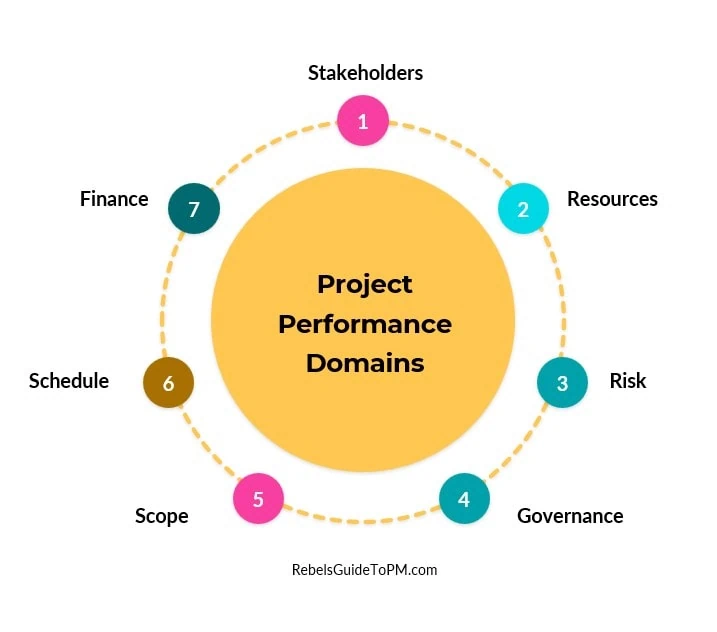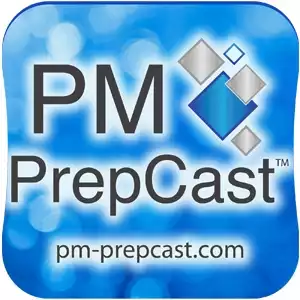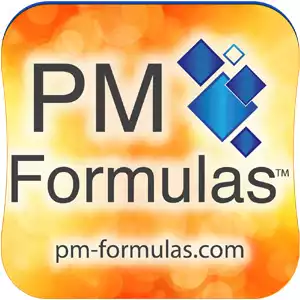Project Performance Domains Explained (Updated for PMBOK 8!)
This blog is reader-supported. When you purchase something through an affiliate link on this site, I may earn some coffee money. Thanks! Learn more.
A Guide to the Project Management Body of Knowledge – (PMBOK® Guide) 8th Edition talks about 7 project management performance domains.
But what are they and how do they fit with the rest of project management practice?
In this article, we’ll explain what the performance domains are and give you some examples of what you need to know about each one.
If you are studying for the Project Management Professional (PMP)® exam, this is the article you need to help you break down and understand what you’ll be tested on.
I think this overview is still helpful for everyone, for example if you are considering a job as a project manager – this is what you’d be doing all day!
What is a performance domain?
PMI defines a domain like this:
[A] group of related processes that are critical for the effective delivery of project value.
Performance domains work together; you can’t use one without the others. You use them throughout your project work. They include a wide range of methods and approaches that you can tailor, as well as processes for performing project management activities.
The 7 performance domains in project management are (at the moment!):
- Governance
- Scope
- Schedule
- Finance
- Stakeholders
- Resources
- Risk
Within each domain, you’ll carry out a range of tasks as a project manager that fall into your responsibilities.

The big thing to note here is that these domains apply regardless of whether you are doing iterative, predictive, or hybrid projects, or any mishmash blend of them all. You still need to engage stakeholders, create effective processes and operate within your business environment: it’s all project management at the end of the day.
In the
The principles of project management from The Standard for Project Management will apply across the domains, so expect to study them all in an integrated way.
Recommended PMP study resources
All the training materials below will help you revise the material covered in each of the domains. (Scroll down for the first domain if you already have your
This complete self-directed PMP Exam course is our top pick. The Elite PLUS bundle includes the PMP training course, the PMP Exam Simulator, The Formula Guide, and The StudyCoach Guidebook, giving students a PMP Study Plan to follow.
Practicing before you take your PMP Exam is the best way to pass the test. This proven tool is brilliant at improving your confidence and highlighting areas where you need to build your skills -- includes detailed answers and references to what to study next.
An interactive and engaging online, self-paced PMP exam prep course. Save 10% when you use our exclusive code RGPM10 at checkout.
An instructor-led virtual PMP Exam prep course for those who prefer a more interactive experience. Save 10% when you use our exclusive code RGPM10 at checkout.
These guidebooks give you a week-by-week study plan to follow to help you in your quest toward your PMP certification. Earn your PMP in 4 or 12 weeks!
Want help studying the math and formulas on the PMP exam? This study guide will help you master them!
Get BrainBOK's comprehensive suite of PMP® exam prep tools, including a full training program, ITTO pack, flashcards, practice exams and a formula guide.
Domain 1: Governance
Governance is the way oversight is applied to the work and defines how decisions are made and what processes are followed.
What do we do in this domain?
We set up governance structures, or adopt ones that are already defined by the PMO. For example, adhering to the monthly reporting cycle or using a steering group as a governance body. You’ll decide on the development approach and lifecycle.
Other project management tasks you might do under the umbrella of governance include:
- Creating a business case and deciding if a project is worthwhile (or not)
- Replanning
- Managing changes
- Following internal processes
- Escalating problems
- Closing a project early
What are the key processes?
The key processes (according to the
- Initiating a project (or phase)
- Integrating and aligning project plans
- Planning your sourcing strategy which is how you are going to deliver the work
- Managing the delivery, quality assurance and knowledge created during the project
- Monitoring and controlling performance to keep the work on track to deliver the project outcomes
- Managing changes
- Closing the project.
What else do you need to know?
Whether you work in predictive or iterative approaches, you do need some kind of governance to make sure the work is progressing the way you said it would, with the right people involved.
In my experience, organizations often have their governance set up already, so unless you are working in a no-PMO, greenfield site, you will lean into organizational approaches that already exist.
Domain 2: Scope
Scope is all about what you are actually delivering on the project. This performance domain helps ensure that the outcome is what everyone is expecting.
What do we do in this domain?
We ensure there is a defined scope with requirements, a baseline, and a work breakdown structure (WBS) – if you use those.
We make sure that quality standards are defined and that the outcomes will deliver the value expected.
What are the key processes?
Ultimately, what you are doing here is controlling the project scope from start to finish. The processes are:
- Plan scope management (how are you going to manage scope?)
- Elicit and analyze requirements (which gives you the requirements documentation)
- Define scope (based on the requirements)
- Develop scope structure
- Monitor and control scope
- Validate scope (to check you delivered what you said you would)
Develop scope structure is the odd one on this list – it’s about subdividing project deliverables. If you work in an
What else do you need to know?
You can’t do this scope work without talking about schedule and finance as well, so this underpins how all the performance domains play together.

Domain 3: Schedule
The project schedule is key deliverable for a project manager – one that we guard and update daily!
What do we do in this domain?
Unsurprisingly, this domain is all about creating and managing your schedule. The key concepts for this domain are the schedule itself and a baseline, estimating, working flexibly, forecasting, tracking actuals and the use of schedule network diagrams (dependency management).
What are the key processes?
The processes are:
- Plan how you are going to manage the schedule (this gives you the schedule management plan))
- Develop the schedule
- Monitor and control the schedule.
That’s it!
What else do you need to know?
You can create schedules at different levels so as the project manager you might not need super detailed plans, if the work package managers or team leaders have these.
Remember to tailor your scheduling approach to the project lifecycle and development approach that you are using. A predictive schedule is going to look (and need to be managed) different to an adaptive or hybrid project schedule.
Domain 4: Finance
The Finance performance domain is where all the procurement and project financial management happens. There is actually a separate section on procurement towards the back of the Guide, as I expect they realised they did need to provide some specific guidance on those processes.
What do we do in this domain?
This area of project management is about managing financial performance like costs, funding sources and actual spending. We control costs, forecast costs, optimize value (whatever that means for you) and make sure we are reporting accurately. You’ll manage contingency funds and reserves.
What are the key processes?
The processes to do in this domain are:
- Plan financial management (which gives you the financial management plan and funding strategy)
- Estimate costs
- Develop budget (gives you the cost baseline)
- Monitor and control finances.
What else do you need to know?
The key concepts for this domain include value maximization, which is about delivering the most you can from the project. For that, you’ll use financial indicators of success like return on investment or internal rate of return. These things used to fall into the Measurement domain, if you’re still seeing material referencing that.
Benefits tracking also falls into this area, in my opinion. Decide on the performance indicators you want to track and make sure those are designed in.
Domain 5: Stakeholders
Stakeholder engagement and communication management are the big goals of this domain.
What do we do in this domain?
This is very similar to the old Knowledge Area from the Sixth Edition and the discussion around stakeholder engagement in the Seventh Edition of the Project Management Institute guidance, and frankly, guidance on how to engage stakeholders hasn’t really changed that much.
It covers stakeholder identification and analysis, and the work to keep people on side during the project. Note that we don’t talk about ‘stakeholder management’ any longer, that’s old terminology.
Sponsor engagement is called out as a specific key concept, so that’s helpful, especially as many project sponsors don’t have a clue about what their job should be.
What are the key processes?
There are 7 processes called out here, which I’ve grouped below:
- Identify stakeholders (in the initiating part of the lifecycle)
- Plan stakeholder engagement and plan communications management
- Manage stakeholder engagement and manage communications
- Monitor stakeholder engagement and monitor communications.
What else do you need to know?
Unsurprisingly, this domain overlaps with pretty much all the others, especially Governance and Finance.
Stakeholders can be internal or external. Keep checking to see if their involvement is ‘working’ – however you define that for your project.
Domain 6: Resources
Almost there, just this one and one more to go!
What do we do in this domain?
‘Resources’ most often means humans, but this domain also calls out that it covers any other type of physical or virtual resources. We have to make sure the resources are available for the project team, used appropriately and maintained.
This used to be wrapped up in the ‘Team’ domain from the old version, if you’re familiar with that.
What are the key processes?
The processes are all about getting and using the people you need – resource allocation 101.
- Plan resource management (which of course gives you the resource management plan)
- Estimate resources
- Acquire resources
- Lead the team
- Monitor and control resourcing.
What else do you need to know?
You might have a resource manager assigned to the project, or need to work with resource managers or the HR team to secure the people required for the project. If that means external consultants, this domain overlaps with the Finance domain so you can secure the budget for the people you need.
Not all teams are created in the same way – remember to tailor your leadership and work management approaches to fit how the team works, and to co-create norms together for a successful outcome. Team dynamics play a big part in how things get done!
Domain 7: Risk
I know these domains are presented in the book in no particular order, and something had to be last, but risk is important!
This used to be covered in the Uncertainty domain, in previous versions.
What do we do in this domain?
This domain has quite a small footprint in comparison to some of the others, because it’s basically the risk management process and responding to uncertainty.
You’ll identify and manage risk and disruption, working flexibly as required.
What are the key processes?
The processes follow the key structure for all the other domains, which is probably clear to you by now:
- Plan risk management (to create the risk management plan)
- Identify risks
- Perform risk analysis
- Plan risk responses
- Implement risk responses
- Monitor risks.
What else do you need to know?
You can read more in my How To Manage Project Risk guide.
Make sure to link project risks back to wider business risks and to link in with the Finance domain work for managing contingency reserves.
Tailoring processes
All these processes and the key concepts that underpin the domains that you’ll have to be familiar with for your
The performance domains are best understood as a way of describing what project managers actually do, rather than prescribing a step-by-step process. They bring together the activities, decisions and behaviors that are essential for delivering value, regardless of whether you are working in a predictive,
In practice, you won’t “work through” the domains one by one. You’ll move between them constantly: engaging stakeholders while managing risk, making governance decisions that affect scope and schedule, or balancing financial constraints against resource availability.
That interdependence is the point. The domains reflect the reality of project work, where nothing exists in isolation.
If you are studying for the
If you are working as a project manager, they provide a helpful checklist for sense-checking whether you are paying attention to the right areas, especially on complex or fast-moving projects.
Ultimately, the value of the performance domains is not in memorizing their definitions or the associated processes, but in using them to think more holistically about how projects deliver outcomes.
When you’re actively considering all seven domains and appropriately tailoring how you approach work, your projects are far more likely to succeed.







